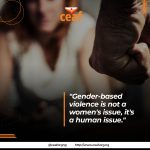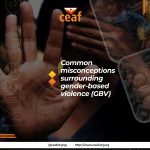Gender-based violence (GBV) and gender inequality are two interconnected societal challenges that threaten the safety, well-being, and progress of all individuals in a community. A society where women face violence and discrimination is not just harmful to the women directly affected—it becomes unsafe and unstable for everyone. This truth resonates deeply in Nigeria, where gender-based violence and inequality continue to hinder development and perpetuate cycles of poverty, fear, and injustice. On Day 4 of the 16 Days of Activism Against Gender-Based Violence, we at the Comfort Empowerment and Advocacy Foundation (CEAF) call on all individuals to join hands in advocating for a society free of GBV, sharing stories, and reflecting on how gender inequality affects us all.
The Cycle of Gender-Based Violence in Nigeria
In Nigeria, the prevalence of GBV is staggering. According to a report by the United Nations, nearly 30% of Nigerian women aged 15-49 have experienced physical or sexual violence by an intimate partner. This statistic only scratches the surface, as many cases go unreported due to cultural stigma, fear of retaliation, or lack of trust in the justice system.
The root cause of this violence often lies in gender inequality—an entrenched societal norm that places women in subordinate roles and denies them the same opportunities, rights, and respect afforded to men. Gender inequality not only enables GBV but also normalizes it, making it an accepted part of life for many. For example, in some communities, harmful practices such as child marriage and female genital mutilation (FGM) are still widely practiced, leaving girls and women physically and emotionally scarred.
How Gender Inequality Affects Women and Society
Gender inequality impacts women in countless ways:
• Economic Disempowerment
Women in Nigeria are often denied access to education and economic opportunities, keeping them financially dependent on men. This dependency increases their vulnerability to abuse, as they may feel they have no choice but to endure violence to maintain a roof over their heads. A 2018 study by the World Bank revealed that Nigeria loses $9.6 billion annually due to gender gaps in labor participation and productivity. By denying women equal opportunities, society denies itself the full potential of its workforce.
• Health Consequences
Survivors of GBV often face severe physical and mental health issues. In the case of FGM, survivors endure chronic pain, infections, and complications during childbirth. The psychological toll of GBV, including anxiety, depression, and post-traumatic stress disorder (PTSD), affects not just the survivor but also their families and communities.
• Perpetuation of Harmful Norms
Gender inequality creates a culture where violence is tolerated or excused. For instance, studies show that many Nigerians, both men and women, believe it is acceptable for a man to beat his wife under certain circumstances. This normalization of violence undermines efforts to create a peaceful and safe society.
• Impact on Future Generations
Children who grow up witnessing violence in their homes or communities are more likely to become perpetrators or victims of violence themselves. Gender inequality perpetuates a cycle of violence that traps families and communities in fear and instability.
Stories of Strength and Advocacy
While the challenges are immense, Nigerian women have also demonstrated extraordinary resilience and courage in the face of GBV. Here are a few examples:
• Osai Ojigho
Osai Ojigho, the Director of Amnesty International Nigeria, is a leading voice against GBV and human rights violations. Through her advocacy, she has highlighted the plight of women in internally displaced persons (IDP) camps who face sexual exploitation and abuse. Her work reminds us of the systemic failures that leave women vulnerable and the urgent need for accountability.
• Aisha Yesufu
Aisha Yesufu, a prominent activist and co-founder of the #BringBackOurGirls campaign, has consistently spoken out against gender inequality and violence. Her advocacy for education, particularly for girls, is a powerful example of how empowering women can create lasting change.
At CEAF, we have seen firsthand the devastating effects of GBV—and the transformative power of intervention. For example, during one of our recent sessions at a school, we spoke to students about sexual awareness and prevention. The interactive session was a wake-up call for many young people, highlighting the importance of early education in breaking the cycle of abuse. CEAF is also building a safe house for survivors, providing them with the shelter and support they need to rebuild their lives.
How Gender Inequality Affects Everyone
While the primary victims of gender inequality and GBV are women, the ripple effects are felt throughout society:
• Economic Instability
A society that marginalizes half its population is inherently inefficient. When women are excluded from education, employment, and leadership, the entire economy suffers. Closing gender gaps could add billions of dollars to Nigeria’s GDP, creating more jobs and improving living standards for all.
• Increased Crime and Instability
Gender inequality often correlates with higher rates of violence, not just against women but within the community at large. When violence is normalized in one context, it becomes more likely to spread to others.
• Erosion of Social Trust
A society that tolerates GBV sends a message that justice and equality are not priorities. This erosion of trust undermines community cohesion and weakens the rule of law.
What Can We Do?
Addressing gender inequality and GBV requires collective action from individuals, communities, organizations, and governments. Here’s how we can all contribute:
• Education and Awareness
Education is a powerful tool for changing mindsets. CEAF’s school outreach programs are a step in the right direction, but we need to expand these efforts to reach more communities.
• Strengthening Laws and Enforcement
Nigeria has laws against GBV, but enforcement remains weak. Advocacy groups must continue to push for stronger implementation and hold perpetrators accountable.
• Empowering Survivors
CEAF’s safe house initiative is an excellent example of how we can support survivors. By providing shelter, counseling, and economic opportunities, we can help them regain their independence and dignity.
• Engaging Men and Boys
Gender equality is not a women’s issue—it’s a societal issue. Men and boys must be engaged as allies in the fight against GBV. Programs that challenge harmful stereotypes and promote healthy relationships are crucial.
A Call to Action
As we continue the 16 Days of Activism, CEAF invites everyone to reflect on how gender inequality affects them personally and what role they can play in ending GBV. Share your stories, support survivors, and speak out against injustice. Together, we can create a society where everyone feels safe, valued, and empowered.
Let us remember: a society that allows violence against women is a society that endangers all. By fighting for gender equality, we are not just protecting women—we are building a safer, stronger, and more just world for everyone.




0 Comments